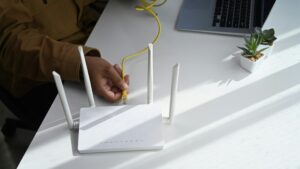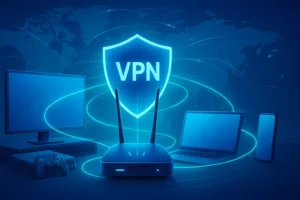In today’s world, where everything we do online feels a little more exposed, protecting your privacy isn’t just smart—it’s necessary. Whether you’re binge-watching your favorite shows, diving into online games, or just scrolling through social media, every device connected to your home network deserves protection. Sure, VPN apps can shield your phone or laptop, but what about all the other gadgets quietly chatting away—smart TVs, gaming consoles, or those smart light bulbs? That’s where VPN routers come in. They cover your entire household with one simple setup so you can stop worrying about which device is secure. In this comprehensive guide, we’ll walk you through how VPN routers work, your setup options, what to expect performance-wise, and the best devices to consider. By the end, you’ll be ready to raise your privacy game and surf safely from every corner of your home.
Why VPN Routers Change the Privacy Game
Most use a VPN app on their laptop or phone—great, but it only protects that one device. A VPN router flips the script, wrapping all your home devices in privacy by encrypting all the data passing through your router. Think of it like putting your whole digital home under one secure roof.
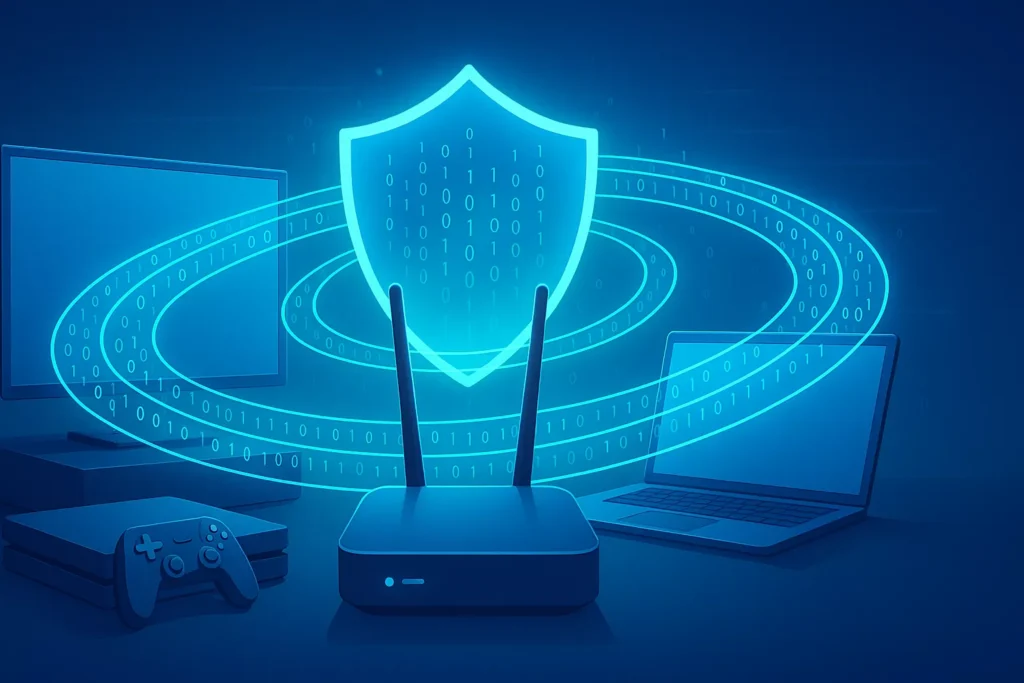
What Makes VPN Routers Worth It?
- One-and-Done Encryption: Instead of juggling VPN apps on each gadget, your router does the heavy lifting for all devices at once.
- Easy, Hassle-Free: No more managing multiple VPN apps or remembering which device is protected. Just set it and forget it.
- Skip Device Limits: Many VPN services limit how many devices you can connect simultaneously, but a VPN router counts as just one device. Freedom for your whole crew!
- Stream Without Borders: Watch geo-blocked shows on any device without the fuss of switching VPN locations every time.
- Central Control Panel: Adjust VPN settings for your entire home network in one place—no more hunting device-by-device.
Setting Up a VPN Router: What Works Best for You?
Getting a VPN running on your router isn’t a one-size solution. Here’s a quick rundown of the three main methods to get up and running:
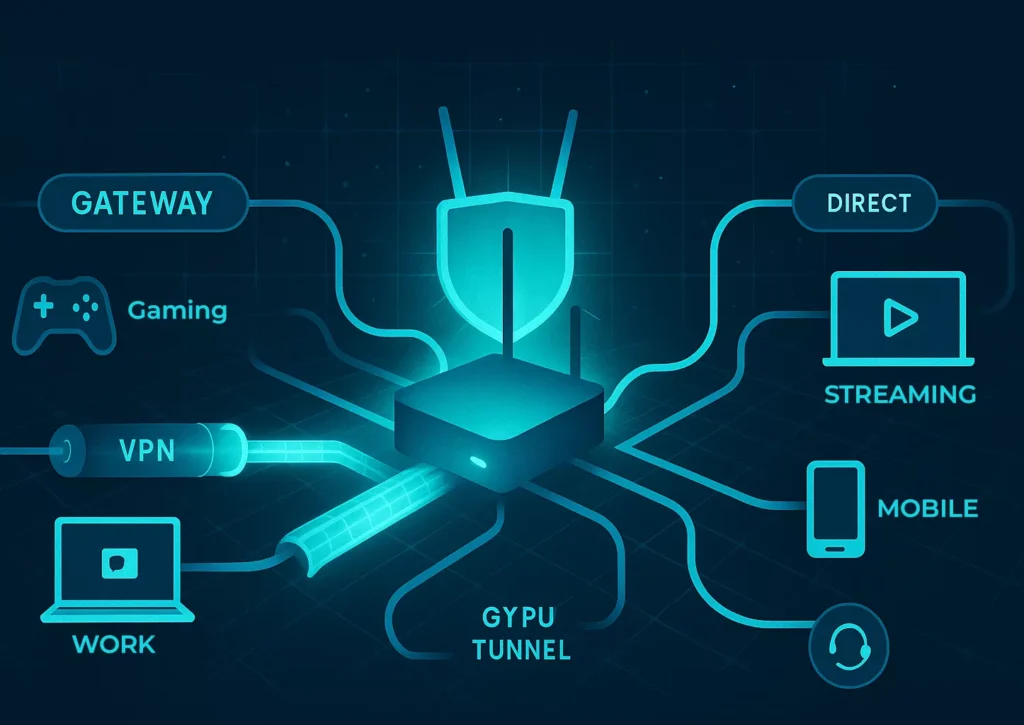
1. Flash Your Router with Custom Firmware
- What’s That? Installing community-made firmware like DD-WRT, Tomato, or OpenWrt that lets your router run VPN connections.
- Why It’s Cool: Access powerful extras like routing rules tailored to your needs or kill switches that shut down internet if the VPN drops.
- Heads Up: This route takes some tech know-how, can brick your router if you slip up, and might void your warranty.
2. Buy a Pre-configured VPN Router
- What It Is: A router that comes ready-made with VPN software, often tuned for your chosen VPN provider.
- Perks: Easy to set up, you get customer support, and it’s safer if you’re not a tech whiz.
- The Catch: Usually pricier upfront than doing it yourself.
3. Pick a Router with Built-in VPN Support
- How It Works: Some routers come with VPN capabilities baked right into their standard software.
- Why You’ll Like It: Setup is simpler since you don’t fiddle with third-party firmware.
- Limitations: Fewer VPN protocol options and usually less room for customizing features.
Which method you choose depends on your comfort with tech, budget, and how much control you want.
Why Your Router’s Muscle Matters: The Performance Piece

VPNs do some serious heavy lifting behind the scenes. Encrypting and decrypting data takes processing power. Many consumer routers aren’t built for that kind of workout, so you might notice your internet slowing down when the VPN is switched on.
Common Speed Bumps
- Internet Crawling: Your usual lightning-fast speeds can take a nosedive — sometimes losing half or more.
- Buffer Nightmare: Slower CPU means more lag or hiccups in games, video calls, or streaming.
Hardware to the Rescue
- Beefy CPUs: Models like the Asus RT-AX88U pack enough punch to handle VPN encryption smoothly, keeping speeds above 100 Mbps.
- VPN Boosters: Gadgets like Sabai Technology’s Sabai VPN Accelerator specialize in offloading VPN processing to dedicated hardware, meaning you don’t have to sacrifice speed for security.
- Firmware Updates: Smart routers get better with age—regular updates optimize VPN performance even on third-party systems like Sabai’s customized Tomato firmware.
What Sets Sabai Technology’s VPN Routers Apart
Sabai Technology isn’t just another name in the crowd—they offer routers running their own Sabai OS, loaded with features designed to make VPNs easier and smarter.
Highlights of Sabai OS
- “Gateways” for Selective Routing: Give certain devices or types of traffic their own paths—some zoom through the VPN tunnel while others take the direct route. Imagine gaming on your PC with full privacy but streaming local shows on your smart TV without slowing down.
- Policy-Based Routing: You control which data goes where—perfect for customizing your network’s flow.
- Automatic Updates & Support: Sabai takes care of firmware updates and offers help so you’re never left guessing.
This kind of control makes life easier for households with mixed needs, balancing privacy, speed, and convenience.
How Fast Can Your VPN Router Really Go?
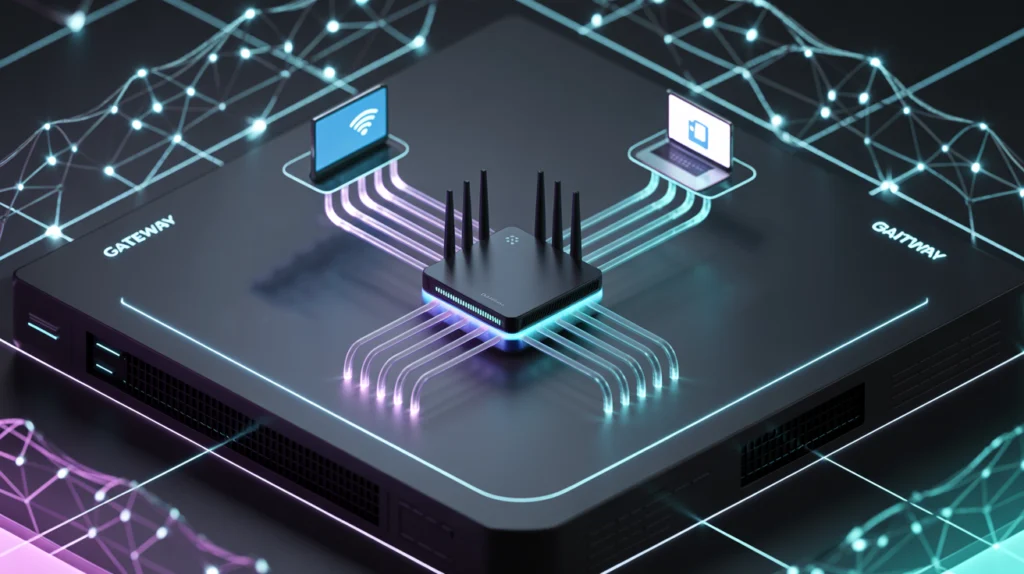
Once, VPN home speeds topping 100 Mbps were a stretch. Today? That’s just the starting line.
Quick Speed Guide
| Router Model | CPU Specs | VPN Speeds |
|---|---|---|
| Asus RT-AX88U | Quad-core 1.8 GHz CPU | Around 300+ Mbps |
| Sabai VPN Accelerator | Dedicated VPN processor | Nearly as fast as your ISP |
| Urban Shield VPN The Marble (GL-B3000) | (2.4GHz) + (5GHz) | 100 Mbps up to 300+ Mbps |
With solid gear, streaming 4K video, gaming online, and transferring big files over VPN don’t have to mean “buffer city.”
Top Tips for Picking and Setting Up Your VPN Router
What to Keep in Mind
- Go for Processing Power: A quad-core 1 GHz or better CPU will keep your VPN flying.
- VPN Protocols Matter: OpenVPN is tried and trusted, but newer options like WireGuard are gaining ground with faster speeds and simpler setups.
- Keep It Simple: For VPN rookies, pre-configured or pre-flashed routers can save a lot of headaches.
- Look for Safety Nets: Features like kill switches (that stop internet if VPN disconnects), policy-based routing, and DNS leak protection really add peace of mind.
- Support & Updates: Stick with brands that keep their firmware fresh and provide helpful customer service.
A Quick Setup Checklist
- Check VPN Compatibility: Make sure your VPN provider plays well with routers.
- Follow Their Setup Guides: Many providers offer step-by-step instructions tailored to popular router models.
- Set Kill Switch & DNS Options: These help keep your real IP hidden if the VPN falters.
- Test Everything: Use speed tests and IP leak tools to confirm that your VPN is working smoothly and securely.
Wrapping It Up: Why a VPN Router Pays Off
A VPN router isn’t just another gadget—it’s a shield for your whole digital home. Whether you’re passionate about your privacy, a gamer craving lag-free security, or someone who wants things to just work without fuss, VPN routers help you take back control and surf safely.
Invest in solid hardware—whether it’s the Asus RT-AX88U, Sabai Technology’s clever routers, or a ready-to-go pre-configured model—and watch your internet experience get faster, safer, and less restricted in one fell swoop.
Handy Resources
- VPN Router Setup Guides: Check out Sabai Technology or Asus Support
- VPN Protocol Showdown: OpenVPN vs. WireGuard explained
- Speed & Privacy Test Sites: Speedtest.net, DNS Leak Test
Take command of your home network with a VPN router—fast, secure, and made to fit your privacy needs.


